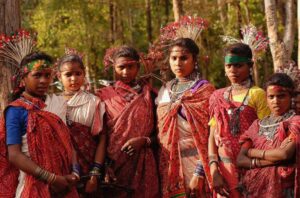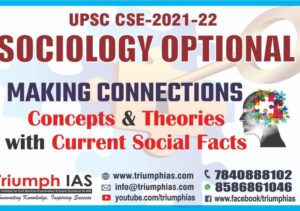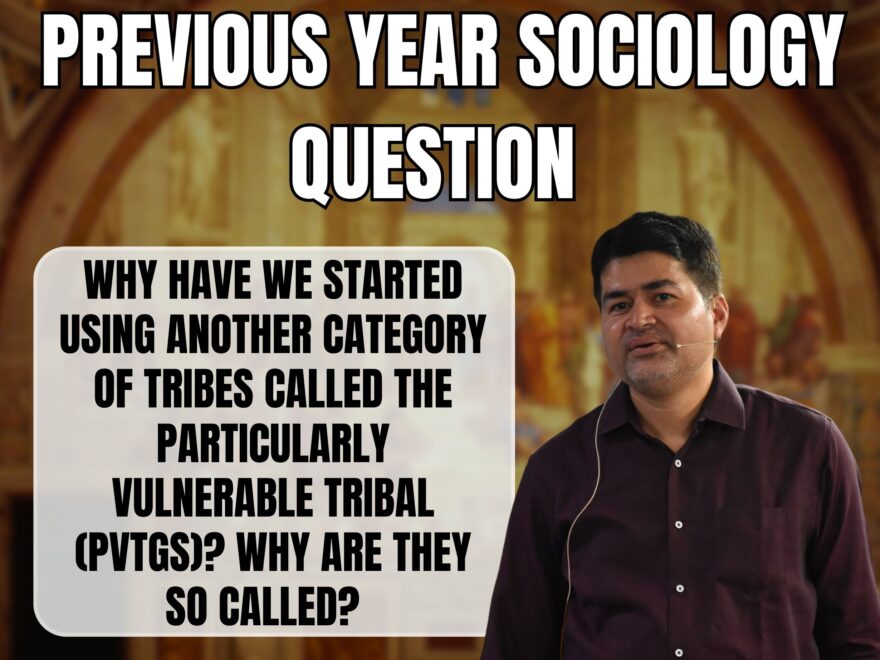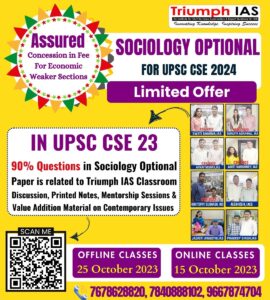Why have we started using another category of tribes called the Particularly Vulnerable Tribal (PVTGs)? Why are they so called?
Section: B
Sociology Paper 2017
(Relevant for Sociology Optional for Civil Services Examination)
Paper 2: Unit 12 Social Structure; Tribal Communities in India

Question: Why have we started using another category of tribes called the Particularly Vulnerable Tribal (PVTGs)? Why are they so called?
– 10 Marks
Introduction: Brief About PVTGsMain Body: Reasons for the Introduction of the PVTG Category and the Origin of the Term Conclusion: Upholding Social Justice on the Lines of Panchsheel.Conclusion: Upholding Social Justice on the Lines of Panchsheel. |
Introduction
- PVTGs, or Particularly Vulnerable Tribal Groups, is a specific category created in India to identify and address the unique vulnerabilities and challenges faced by certain indigenous or tribal communities.
- This categorization was introduced to recognize that not all tribal groups experience the same level of vulnerability, and some require special attention and support due to their extreme marginalization and distinct characteristics. There are 75 tribes in PVTGs. Examples : Jarwa, Onge, Paharia
Main Body:
Reasons For The Introduction Of The PVTG Category And The Origin Of The Term:
- Disparities in the development rates: Dhebar Commission disparities in the development rates among Scheduled Tribes were observed. As a result, a subcategory known as “Primitive Tribal Groups” was introduced. However, in 2006, this classification was renamed as “Particularly Vulnerable Tribal Groups” (PVTGs).
- Historical Marginalization: Many tribal communities in India have historically faced marginalization, dispossession of land, and discrimination. However, within this larger group, there are certain communities that have been even more isolated and marginalized than others.
- Distinct Cultural Practices: PVTGs are often characterized by their unique cultural practices, languages, and lifestyles that set them apart from other tribal communities. These practices are often at risk of extinction due to their extreme isolation.
- Geographic Isolation: PVTGs typically inhabit remote and geographically isolated regions, making it challenging for them to access mainstream services, education, healthcare, and employment opportunities.
- Extreme Vulnerability: PVTGs are among the most vulnerable communities in India. They often suffer from extreme poverty, malnutrition, illiteracy, and lack of access to basic amenities.
- Recognition of Diversity: Recognizing the diversity within tribal communities, the government of India identified the need to differentiate between tribes based on their level of vulnerability and unique characteristics.
- Constitutional Safeguards: The Indian Constitution, through its Fifth Schedule and Sixth Schedule, provides special protections for tribal communities, including PVTGs, to preserve their distinct identity, culture, and way of life.
- Policy and Welfare Measures: The categorization of PVTGs helps in the formulation of targeted policies and welfare measures aimed at addressing their specific needs and challenges, including land rights, healthcare, education, and economic development.
- Inclusive Development: By recognizing PVTGs and their unique vulnerabilities, the Indian government seeks to ensure that development programs and policies are inclusive and take into account the specific requirements of these communities
Conclusion
- In line with the principles of Panchsheel, which promote peaceful coexistence and mutual respect, the recognition of Particularly Vulnerable Tribal Groups (PVTGs) in India underscores the nation’s commitment to inclusive development.
- By acknowledging the diverse vulnerabilities and unique cultural heritage of these communities, India upholds the values of equity and social justice. The PVTG category serves as a testament to the nation’s dedication to preserving the rich tapestry of its tribal heritage while ensuring that no community is left behind in its journey towards progress.
Related Blogs …
 |
 |

To master these intricacies and fare well in the Sociology Optional Syllabus, aspiring sociologists might benefit from guidance by the Best Sociology Optional Teacher and participation in the Best Sociology Optional Coaching. These avenues provide comprehensive assistance, ensuring a solid understanding of sociology’s diverse methodologies and techniques.
META TAGS:
Particularly Vulnerable Tribal Groups, PVTGs, tribal communities, tribal equity, historical marginalization, cultural preservation, geographic isolation, inclusive development, Indian tribes, tribal diversity, tribal vulnerability, social justice, governmental policies, Panchsheel principles, tribal inclusion, tribal development strategies, tribal heritage, targeted welfare measures
Why Vikash Ranjan’s Classes for Sociology?
Proper guidance and assistance are required to learn the skill of interlinking current happenings with the conventional topics. VIKASH RANJAN SIR at TRIUMPH IAS guides students according to the Recent Trends of UPSC, making him the Best Sociology Teacher for Sociology Optional UPSC.
At Triumph IAS, the Best Sociology Optional Coaching platform, we not only provide the best study material and applied classes for Sociology for IAS but also conduct regular assignments and class tests to assess candidates’ writing skills and understanding of the subject.
Choose The Best Sociology Optional Teacher for IAS Preparation?
At the beginning of the journey for Civil Services Examination preparation, many students face a pivotal decision – selecting their optional subject. Questions such as “which optional subject is the best?” and “which optional subject is the most scoring?” frequently come to mind. Choosing the right optional subject, like choosing the best sociology optional teacher, is a subjective yet vital step that requires a thoughtful decision based on facts. A misstep in this crucial decision can indeed prove disastrous.
Ever since the exam pattern was revamped in 2013, the UPSC has eliminated the need for a second optional subject. Now, candidates have to choose only one optional subject for the UPSC Mains, which has two papers of 250 marks each. One of the compelling choices for many has been the sociology optional. However, it’s strongly advised to decide on your optional subject for mains well ahead of time to get sufficient time to complete the syllabus. After all, most students score similarly in General Studies Papers; it’s the score in the optional subject & essay that contributes significantly to the final selection.
“A sound strategy does not rely solely on the popular
Opinion of toppers or famous YouTubers cum teachers.”
It requires understanding one’s ability, interest, and the relevance of the subject, not just for the exam but also for life in general. Hence, when selecting the best sociology teacher, one must consider the usefulness of sociology optional coaching in General Studies, Essay, and Personality Test.
The choice of the optional subject should be based on objective criteria, such as the nature, scope, and size of the syllabus, uniformity and stability in the question pattern, relevance of the syllabic content in daily life in society, and the availability of study material and guidance. For example, choosing the best sociology optional coaching can ensure access to top-quality study materials and experienced teachers. Always remember, the approach of the UPSC optional subject differs from your academic studies of subjects. Therefore, before settling for sociology optional, you need to analyze the syllabus, previous years’ pattern, subject requirements (be it ideal, visionary, numerical, conceptual theoretical), and your comfort level with the subject.
This decision marks a critical point in your UPSC – CSE journey, potentially determining your success in a career in IAS/Civil Services. Therefore, it’s crucial to choose wisely, whether it’s the optional subject or the best sociology optional teacher. Always base your decision on accurate facts, and never let your emotional biases guide your choices. After all, the search for the best sociology optional coaching is about finding the perfect fit for your unique academic needs and aspirations.
Follow us:
🔎 https://www.instagram.com/triumphias
🔎https://www.youtube.com/c/TriumphIAS
🔎https://t.me/VikashRanjanSociology
Find More Blogs
| Compare and contrast Karl Marx’s and Max weber’s | Karl Marx- Historical Materialism |
| Talcott Parsons : Social system | Scope of the subject and comparison with other social sciences |



